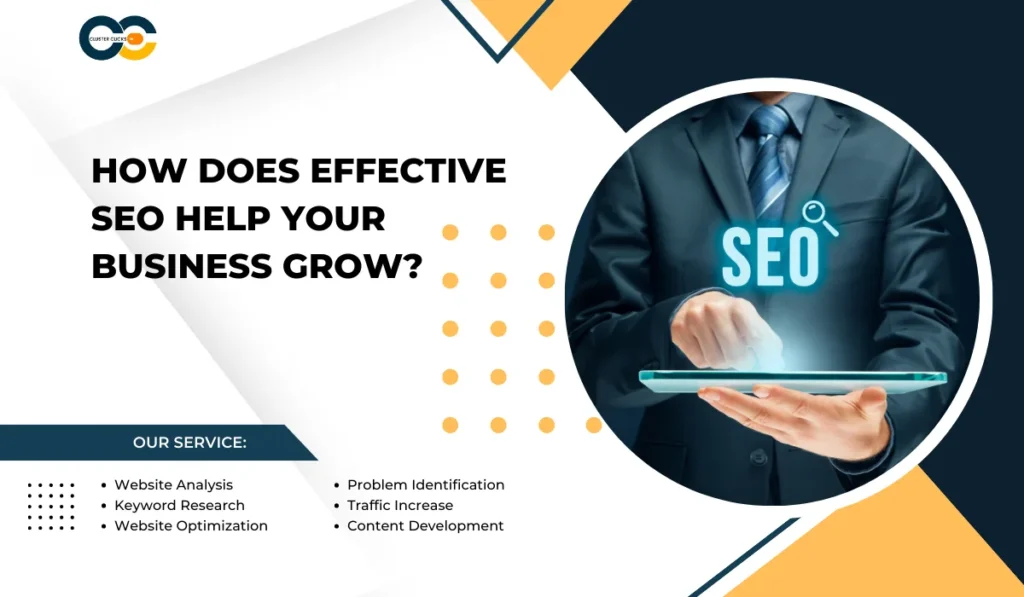Search engine optimization (SEO) is a crucial strategy that every business should utilize to increase visibility, attract more customers, and ultimately drive growth. Implementing effective SEO strategies can seem daunting, but they offer tremendous benefits.
Effective SEO strategies help your website rank higher in search engines like Google so more people can find your business online. Higher rankings lead to increased website traffic and more conversions into paying customers.
For small businesses with limited marketing budgets, SEO represents an affordable way to boost visibility and compete with bigger brands. Whether you run a local pizza shop or an ecommerce store, SEO can connect you with local customers searching for your products and services.
Also you can conduct SEO audits to identify areas that need improvement and optimize your site for higher rankings and better performance.
This article will explore how effective SEO works, key SEO strategies, and how to use SEO to take your business to the next level.
What Does Effective SEO Look Like?
Effective SEO enhances your online presence through both on-page optimization and off-page optimization tactics.
On-page SEO includes optimizing website content with relevant keywords, crafting SEO-friendly page titles and meta descriptions, ensuring fast load times, and creating an intuitive site architecture. Off-page SEO focuses on building high-quality backlinks from other websites to signal search engines that your site provides value.
When done right, SEO makes your website shine for potential customers. You’ll rank higher in local searches related to your business and see more traffic from organic search instead of only paid ads.
An effective SEO strategy also sets up your website for long-term, sustainable growth versus short bursts from individual marketing campaigns.
Effective SEO Strategies Help Your Business Grow
Implementing SEO provides a variety of benefits that help small businesses scale, including:
Increasing Brand Awareness & Credibility
By ranking on the first page of search engines for relevant keywords, SEO grows brand visibility and establishes credibility. Consumers equate high rankings with trust and expertise. SEO helps you stand out from competitors all trying to rank for those same keywords.
Driving Qualified Traffic to Your Website
Effective SEO directs motivated visitors to your site ready to buy your products or services. These visitors already searched for terms related to your business, so they have high purchase intent. SEO delivers targeted, high-quality traffic versus broad advertising campaigns.
Boosting Conversions & Sales
Higher SEO rankings and more website traffic combine to drive more conversions and sales. In fact, rankings #1-3 in Google’s search results account for over 50% of all clicks. Capturing that prime real estate connects you with buyers ready to convert.
Supporting Digital Marketing & Advertising
SEO perfectly complements additional digital marketing like pay-per-click ads and social media. Your ads and campaigns will perform better supported by organic rankings directing traffic.
Effective SEO also cuts advertising costs over the long run by reducing dependency on paid ads.
Improving Customer Experience & Engagement
On-page SEO creates easy, engaging customer experiences by optimizing site speed and navigation. Fast load times keep visitors on pages longer. SEO-optimized content also answers questions and educates visitors to guide them towards conversions.
Generating Sustainable Growth & Revenue
Unlike paid ads that stop driving traffic and sales once turned off, SEO delivers lasting results. Consistent SEO fuels continuous website traffic and conversions month after month. This recurring revenue stream costs little to maintain once rankings are achieved.
SEO Best Practices to Help Your Business
While tactics differ across industries, core SEO best practices apply to businesses of all types and sizes:
Research Target Keywords
Identify the terms and questions your customers search related to your products, services and local area. Optimizing for these specific keywords earned through research helps pages rank #1.
Optimize Website Content
Craft SEO-friendly page titles, headings, URLs and meta descriptions. Check that content answers search queries and include keywords naturally.
Improve Site Speed
Faster load times improve visitor experience and search rankings, so compress images, minify code, and optimize pages for performance.
Build Quality Backlinks
Earn trustworthy external backlinks from industry websites and directories like Google My Business to signal value to algorithms.
Track SEO Performance
Use analytics to monitor organic traffic, rankings, conversion rates. Review insights monthly to refine SEO efforts and demonstrate ROI.
Create Fresh, Useful Content
Well-written blog posts and videos that target key terms can outperform competitors with thin content. Update sites regularly to engage visitors.
Bringing It All Together: Effective SEO Strategies
With the right SEO strategy tailored to your business, you can outperform competitors, increase qualified traffic to your site, convert visitors into happy customers, and build sustainable revenue streams.
Here is a recap of key points for developing your SEO game plan:
✔️ Research target keywords and optimize pages for rankings
✔️ Improve website speed and navigation ✔️ Create SEO-friendly content that answers customer questions ✔️ Build high-quality backlinks from industry websites ✔️ Track SEO analytics like rankings and traffic monthly ✔️ Complement SEO with digital ads and social media
Committing to long-term, effective SEO strategies align with the customer journey to drive brand awareness, increase website traffic, and boost conversions over time. By understanding SEO best practices, any small business can utilize this digital marketing pillar to attract customers and enable sustainable growth.

